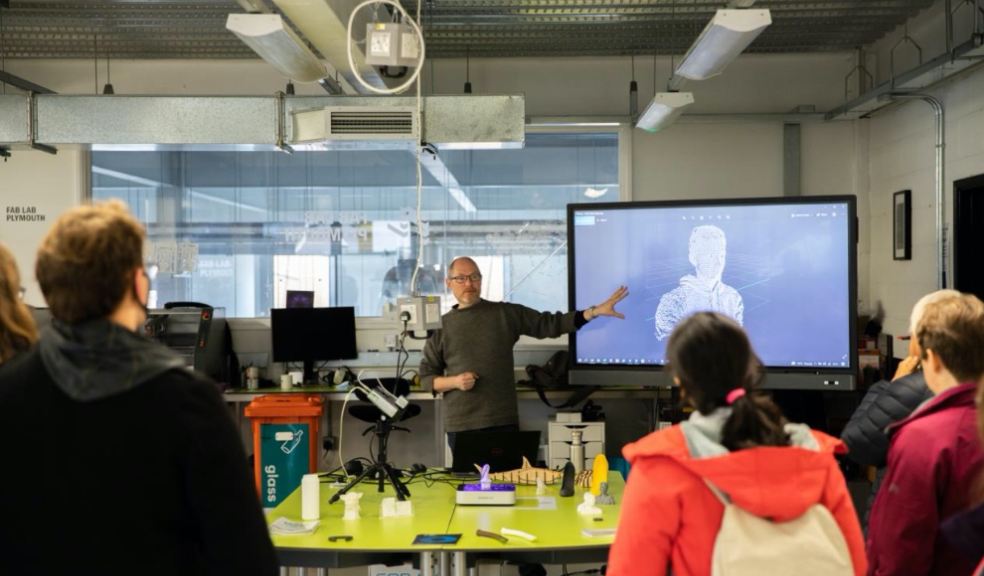
Revealing Plymouth’s shipwrecked histories with 3D scanning
Archaeological artefacts recovered from shipwrecks in Plymouth Sound that reveal Plymouth’s links to empire, slavery and indenture have been brought to life through 3D scanning at Fab Lab Plymouth, in a collaboration between Plymouth College of Art’s Smart Citizens Programme, local archaeological team the SHIPS Project and internationally-renowned artist and photographer, Dr Mohini Chandra.
Using 3D scanning technology in Fab Lab Plymouth, important maritime objects discovered by the SHIPS team were digitally recorded in intricate detail and reproduced through 3D printing. The objects scanned include a copper manilla - an early trade token for the West Africa trade - recovered from a likely slave wreck in Plymouth Sound (c. 1580-1680) and a copper rag bolt recovered from a Royal Navy ship, HMS Amethyst (1811).
Through the innovative use of digital fabrication processes, the archaeological finds were recorded for future research and had their stories brought to life, creating accurate 3D printed replicas that can be handled without causing damage to the original artefacts. The SHIPS Project, an independent archaeology research group and community interest company, can now use the 3D prints as an educational tool, allowing the public to physically connect with elements of Plymouth’s maritime histories that were previously hidden on the seabed of Plymouth Sound.
Stray Finds
As part of the collaboration between the Smart Citizens Programme, the SHIPS Project and Dr Mohini Chandra, local people were invited to join the Stray Finds event at Plymouth College of Art to view Dr Mohini Chandra’ exhibition Paradise Lost at MIRROR, examine shipwreck artefacts and ‘treasure’ and visit the Fab Lab. Local divers and collectors from the South West were also invited to bring favourite finds along to show and to discuss them with archaeology experts from the SHIPS Project team.
Mallory Haas, Director of the SHIPS Project, said: “We started the Stray Finds Project so we could see what the diving community has recovered over the last 50 years. The diving community is very active in Plymouth and in the South West, and because the sports divers hold a great deal of knowledge on the shipwrecks and finds recovered from the coast, it's important to record this information before we lose the chance. Many of these finds are common things, like Victorian bottles and bass material recovered from metal wrecks. However, in many divers’ collections is a rare item that may be misidentified, as we have seen many times before. This is how we discovered the only Roman-Greeco lead ancho core to be found in the UK, or several Bronze age stone anchors, and the most amazing roman pottery and amphoras.
“The information these artefacts hold tells the story of the earliest trade with Britain, these artefacts are of great significance and are vital to telling the story of Plymouth as a maritime landscape. By holding events like the Stray Finds day at Plymouth College of Art, we are building a relationship with the diving community and locals who have an interest in history. By holding the event at the College we are expanding the reach events like this can have beyond the diving and maritime community, and involving students and academics that usually may not know this type of culture exists.”
Paradise Lost explored the history of shipwrecks in the historic naval port city of Plymouth and reflected on the complex movement of people and objects within the colonised world, with a focus on Mohini’s own ancestors’ journeys aboard indenture ships. Alongside a new film work featuring a specially commissioned song, ‘Ei Dubonto Shomoy’, written and performed by Kolkata based archivist and composer Moushumi Bhowmik, as a lament for ‘lost souls’, Mohini also worked with the SHIPS Project to unearth and photograph artefacts from shipwrecks in Plymouth. This work forms part of the SHIPS’ latest Stray Finds Project, which aims to locate and record objects recovered from the sea and make these records accessible through the SHIPS Project website.
Dr Mohini Chandra, said, “The SHIPS Project's outreach activities include working with the local diving community to study, catalogue and understand artefacts brought up from the numerous shipwrecks in Plymouth Sound and the South West region. The Stray Finds events are an important part of this process, allowing divers to bring in material and have it assessed. The SHIPS Project is then able to glean and record further important first hand information about artefacts and the underwater sites at which they were found. At this event, hosted at Plymouth College of Art, members of the general public and divers were also able to see the exhibition, view and handle previously collected items from the local marine area and talk to the archaeology team. They also visited the Fab Lab to look at the processes involved in mapping and 3D printing from original artefacts such as the 'slave manilla' found in Plymouth Sound, which also featured in the exhibition.”
“This was an important event, bringing arts practice, archaeology and new audiences such as the diving community together at Plymouth College of Art for the first time to explore the different ways that artefacts can be interpreted; both through arts practice and archaeology as well as contemporary technology such as 3D printing, which can make artefacts more accessible to the public. Importantly the SHIPS Project team found a number of unusual and unique items in the material brought forward which they recorded and catalogued on the day.”
Participants were also invited to a special tour of Fab Lab Plymouth, to discover the process of 3D scanning and 3D printing and how these modern digital fabrication technologies can be combined with archaeology research to record, protect and reproduce important historical artefacts.
This activity has been supported by The Department for Digital, Culture, Media and Sport, who fund the Cultural Development Fund, which is administered by Arts Council England.
Mohini Chandra’s exhibition ‘Paradise Lost’ was supported by Arts Council England, Plymouth College of Art and MIRROR.















